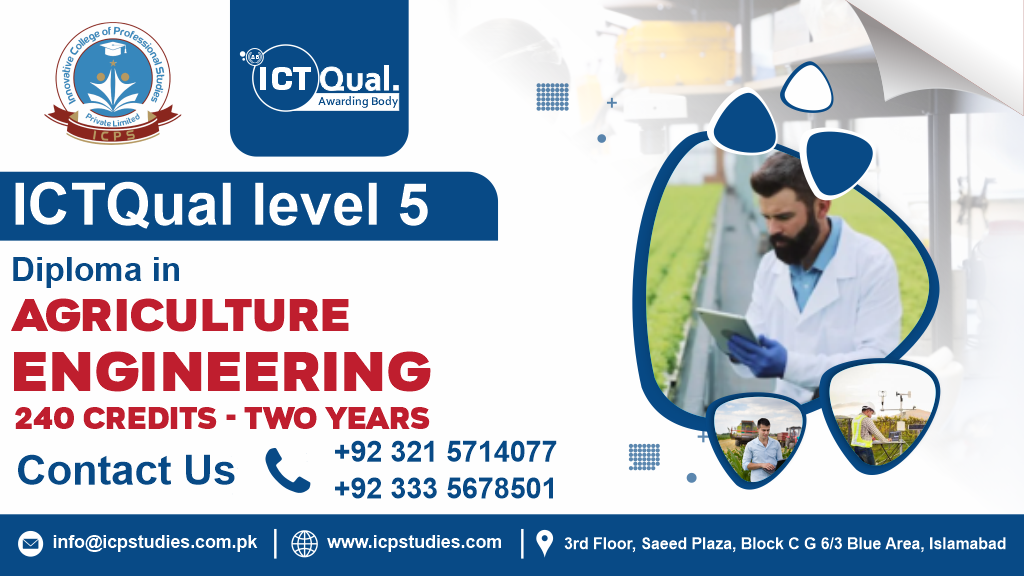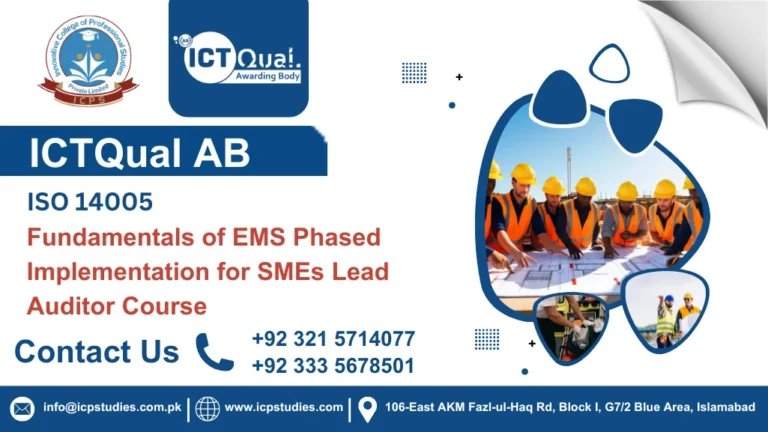The ICTQual Level 5 Diploma in Agricultural Engineering (240 credits) is a comprehensive two-year program designed for those looking to pursue a career in the dynamic field of agricultural engineering. As modern agriculture continues to evolve with technological advancements, sustainable practices, and an increased demand for productivity, this qualification provides students with the knowledge and skills needed to take on leadership and technical roles in agricultural engineering. This course offers a perfect blend of theoretical learning, hands-on practical experience, and industry-relevant skills, ensuring graduates are prepared to drive innovation and efficiency in agriculture.
The ICTQual Level 5 Diploma in Agricultural Engineering is an advanced qualification focused on enhancing technical expertise in the agricultural sector. Over the span of two years, students will dive deep into the study of agricultural machinery, precision farming, renewable energy integration, automation, soil and water management, and more. This program is designed for individuals who are looking to expand their knowledge and take on more complex engineering roles in the agricultural industry. The course is structured to combine core engineering principles with the latest agricultural technologies, enabling students to manage projects and systems that improve the productivity, sustainability, and environmental impact of agricultural operations.
The ICTQual Level 5 Diploma in Agricultural Engineering is an advanced qualification designed to provide students with the skills, knowledge, and practical experience necessary to thrive in the modern agricultural sector. With a focus on innovative technologies, sustainable practices, and project management, this two-year course prepares graduates for a wide range of rewarding career opportunities in agricultural engineering. Whether you’re aiming to manage complex projects, design advanced machinery, or integrate sustainable energy solutions, this diploma is the perfect pathway to a successful career in agricultural engineering.
All About ICTQual Level 5 Diploma in Agriculture Engineering 240 Credits – Two Years
Course Overview
The ICTQual Level 5 Diploma in Agricultural Engineering (240 Credits) is a comprehensive two-year qualification designed to provide students with advanced knowledge and practical skills in the field of agricultural engineering. As agriculture continues to evolve with technological advancements and the need for sustainable practices, this diploma prepares individuals for leadership and technical roles in the industry.
This course covers key areas such as agricultural machinery, automation, precision farming, renewable energy, soil and water management, and agricultural infrastructure. It combines core engineering principles with modern agricultural technologies, ensuring that students gain the expertise needed to tackle the challenges of the evolving agricultural landscape. By the end of the course, students will be equipped to optimize farming operations, implement sustainable solutions, and manage complex engineering projects, making them highly valuable to employers in the agricultural sector.
Study Units
- Year 1:
- Introduction to Agricultural Engineering Principles
- Applied Mechanics in Agriculture
- Agricultural Machinery and Equipment
- Hydraulics and Pneumatics in Agriculture
- Soil and Water Management Systems
- Electrical and Electronic Systems in Agriculture
- Introduction to Agricultural Structures
- Sustainable Farming Technologies
- Basic Agricultural Safety Practices
- Crop and Livestock Machinery
- Mechanical Design and CAD for Agricultural Engineering
- Introduction to Farm Management
- Year 2:
- Advanced Agricultural Engineering Principles
- Renewable Energy Applications in Agriculture
- Advanced Irrigation and Water Management Systems
- Precision Agriculture Technologies
- Farm Mechanization and Automation
- Agricultural Environmental Engineering
- Maintenance and Repair of Agricultural Machinery
- Agricultural Engineering Project Management
- Agricultural Engineering Systems Integration
- Sustainable Farm Design and Layout
- Business and Entrepreneurship in Agricultural Engineering
- Research and Development in Agricultural Engineering
To enroll in the ICTQual Level 5 Diploma in Agricultural Engineering (240 Credits), applicants must meet the following entry requirements:
- Educational Qualifications:
- A Level 3 qualification in a relevant field, such as Agricultural Engineering, Mechanical Engineering, Civil Engineering, or any other technical discipline.
- Alternatively, applicants with a general secondary education (A-levels, high school diploma, or equivalent) may be considered, particularly if they have a strong interest in agricultural technologies or engineering.
- Work Experience (optional but advantageous):
- While not mandatory, applicants with relevant work experience in agriculture, farming, or engineering-related roles will be given preference. This experience will enhance understanding and application of theoretical concepts.
- Mathematical and Analytical Skills:
- Basic to intermediate proficiency in mathematics, including algebra, geometry, and basic calculus, as the course involves technical calculations, problem-solving, and engineering analysis.
- English Language Proficiency:
- Applicants must have a strong command of the English language, both written and spoken, as the course content and assessments are conducted in English. If English is not the applicant’s first language, proof of English proficiency (such as IELTS or TOEFL) may be required.
- Commitment to Learning:
- A genuine interest in agricultural engineering, technology, and sustainability, coupled with the ability to commit to a two-year program of study. Applicants should be motivated to engage with both theoretical learning and practical work in the field.
Applicants who do not meet all the requirements may still be considered based on relevant work experience, other qualifications, or a personal statement, subject to approval by the admissions team.
The ICTQual Level 5 Diploma in Agricultural Engineering (240 Credits) is ideal for individuals seeking to advance their careers in the agricultural engineering field. This course is suitable for:
- Aspiring Agricultural Engineers:
- Individuals looking to specialize in agricultural engineering and develop advanced technical skills in machinery, automation, and sustainable farming practices.
- Professionals in Agriculture and Engineering:
- Those already working in farming, agriculture, or engineering who wish to upgrade their skills and take on more advanced, leadership roles in agricultural technology and engineering.
- Engineering Graduates:
- Mechanical, civil, or electrical engineers seeking to apply their knowledge to the agricultural sector, with a focus on modern agricultural systems, sustainability, and technology integration.
- Farm Managers and Supervisors:
- Those in managerial or supervisory roles in agricultural operations looking to integrate advanced engineering techniques into farm management and improve productivity, sustainability, and efficiency.
- Technologically-Inclined Individuals:
- People with a strong interest in the integration of automation, robotics, data analytics, and renewable energy technologies in agriculture to enhance farming practices and address industry challenges.
- Career Changers:
- Professionals with a background in engineering, environmental sciences, or related fields who are interested in transitioning to the agricultural engineering sector to specialize in cutting-edge agricultural technologies and sustainability.
This course is designed for individuals who want to play a pivotal role in shaping the future of agriculture through innovation, sustainable practices, and advanced engineering solutions. Whether you’re aiming for a technical, managerial, or project leadership position in agricultural engineering, this diploma offers the expertise needed to succeed in the evolving agricultural industry.
Learning Outcomes
Year 1:
- Introduction to Agricultural Engineering Principles
- Understand core agricultural engineering concepts.
- Recognize the critical role of engineering in modern farming practices.
- Apply basic engineering principles to agricultural systems.
- Applied Mechanics in Agriculture
- Demonstrate knowledge of mechanical principles used in agriculture.
- Apply concepts of force, motion, and mechanics to agricultural machinery.
- Solve mechanical issues related to farming equipment.
- Agricultural Machinery and Equipment
- Identify and describe various types of agricultural machinery.
- Understand the operation, maintenance, and troubleshooting of farming equipment.
- Select appropriate machinery for specific agricultural tasks.
- Hydraulics and Pneumatics in Agriculture
- Understand hydraulic and pneumatic systems in agricultural systems.
- Apply hydraulic and pneumatic technologies to agricultural machinery.
- Troubleshoot common hydraulic and pneumatic system issues.
- Soil and Water Management Systems
- Explain the relationship between soil, water, and agricultural productivity.
- Implement efficient soil and water management practices.
- Design basic irrigation and drainage systems for sustainable farming.
- Electrical and Electronic Systems in Agriculture
- Understand the role of electrical and electronic systems in agriculture.
- Apply electrical principles to agricultural equipment.
- Troubleshoot common electrical issues in farming machinery.
- Introduction to Agricultural Structures
- Understand the design and construction principles of agricultural buildings.
- Identify various types of agricultural structures and their uses.
- Learn about structural safety and sustainability in farming environments.
- Sustainable Farming Technologies
- Recognize the importance of sustainability in agriculture.
- Apply engineering solutions to enhance resource efficiency and minimize environmental impact.
- Explore renewable energy technologies used in farming.
- Basic Agricultural Safety Practices
- Identify potential hazards in agricultural environments.
- Understand health and safety practices specific to agricultural engineering.
- Implement safe operating and maintenance practices for machinery.
- Crop and Livestock Machinery
- Identify and understand the machinery used in crop and livestock production.
- Apply operational knowledge to effectively use these machines.
- Troubleshoot and maintain crop and livestock machinery.
- Mechanical Design and CAD for Agricultural Engineering
- Apply mechanical design principles to agricultural engineering projects.
- Use computer-aided design (CAD) tools to create agricultural machinery designs.
- Develop prototypes based on CAD designs.
- Introduction to Farm Management
- Understand the fundamentals of farm management and agricultural operations.
- Apply concepts of resource planning, budgeting, and farm optimization.
- Recognize how engineering can improve farm efficiency.
Year 2:
- Advanced Agricultural Engineering Principles
- Deepen understanding of advanced engineering principles applied to agriculture.
- Solve complex engineering problems in agricultural systems.
- Apply advanced concepts in mechanics, thermodynamics, and materials science.
- Renewable Energy Applications in Agriculture
- Understand the use of renewable energy sources in agricultural operations.
- Design systems that integrate solar, wind, and biomass energy into farming practices.
- Evaluate the cost and environmental benefits of renewable energy solutions.
- Advanced Irrigation and Water Management Systems
- Design and implement advanced irrigation systems for sustainable water use.
- Apply modern technologies to optimize water usage on farms.
- Address water management and conservation challenges.
- Precision Agriculture Technologies
- Apply GPS, remote sensing, and data analytics to enhance agricultural production.
- Understand how precision farming technologies improve efficiency and yields.
- Implement precision agriculture solutions to reduce costs and increase sustainability.
- Farm Mechanization and Automation
- Explore automation in agricultural machinery to improve efficiency.
- Understand the role of robotics and autonomous systems in modern farming.
- Apply mechanization to reduce labor costs and increase productivity.
- Agricultural Environmental Engineering
- Identify and address environmental challenges in agriculture.
- Develop engineering solutions to mitigate environmental impacts like soil erosion, waste, and pollution.
- Implement sustainable practices in farming systems.
- Maintenance and Repair of Agricultural Machinery
- Develop practical skills to maintain and repair agricultural machinery.
- Diagnose mechanical issues and implement effective repair strategies.
- Understand the importance of regular maintenance to extend equipment lifespan.
- Agricultural Engineering Project Management
- Understand project management principles specific to agricultural engineering.
- Plan, execute, and manage agricultural engineering projects from initiation to completion.
- Apply budgeting, scheduling, and resource management techniques to engineering projects.
- Agricultural Engineering Systems Integration
- Integrate various agricultural engineering systems (e.g., machinery, irrigation, automation) into cohesive solutions.
- Solve challenges related to system integration in agricultural operations.
- Ensure all systems work efficiently together to optimize farm performance.
- Sustainable Farm Design and Layout
- Design farms with a focus on sustainability, optimizing land use and resource efficiency.
- Implement engineering solutions for sustainable farm layout and operations.
- Understand and mitigate the environmental impacts of farm design.
- Business and Entrepreneurship in Agricultural Engineering
- Develop entrepreneurial skills for launching and managing agricultural engineering ventures.
- Understand the market dynamics and commercial potential of agricultural technologies.
- Create business plans for innovative engineering solutions in the agricultural sector.
- Research and Development in Agricultural Engineering
- Conduct research to address current challenges and trends in agricultural engineering.
- Develop innovative solutions to improve agricultural practices.
- Stay informed about the latest technological advancements in the field and their application in agriculture
FAQs about ICTQual Level 5 Diploma in Agriculture Engineering 240 Credits – Two Years







